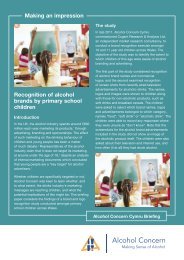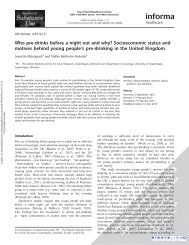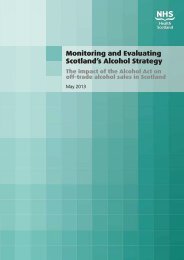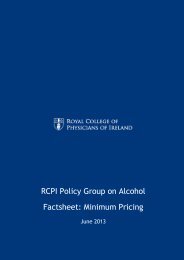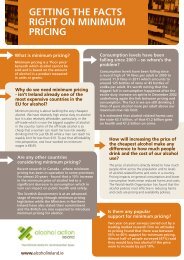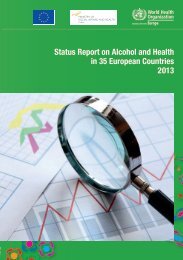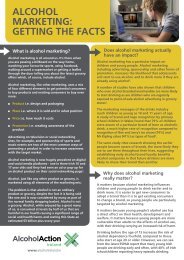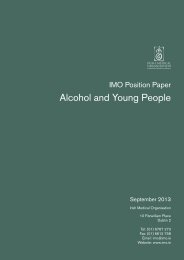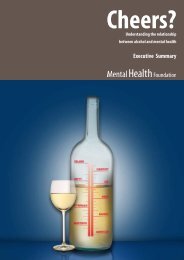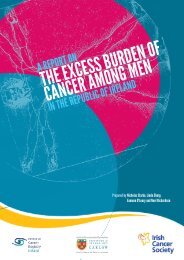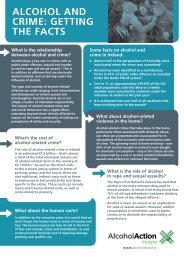Addressing the harmful use of alcohol - WHO Western Pacific Region
Addressing the harmful use of alcohol - WHO Western Pacific Region
Addressing the harmful use of alcohol - WHO Western Pacific Region
Create successful ePaper yourself
Turn your PDF publications into a flip-book with our unique Google optimized e-Paper software.
<strong>Addressing</strong> <strong>the</strong> <strong>harmful</strong> <strong>use</strong> <strong>of</strong> <strong>alcohol</strong> : A guide to developing effective <strong>alcohol</strong> legislation<br />
In 2008 Thailand passed legislation that included a prohibition on advertising or display <strong>of</strong><br />
names or <strong>alcohol</strong> brands deemed to promote <strong>the</strong>ir qualities or to persuade people to drink<br />
<strong>alcohol</strong>, ei<strong>the</strong>r directly or indirectly. These restrictions do not apply to advertisements<br />
broadcast from outside Thailand. However, <strong>the</strong> failure to exclude advertising with an element<br />
<strong>of</strong> social good has led to widespread branded promotion <strong>of</strong> such things as sponsorship <strong>of</strong><br />
academic scholarships for young people.<br />
France has <strong>the</strong> most comprehensive regulation on <strong>alcohol</strong> marketing, limiting both exposure<br />
and content. Following a period <strong>of</strong> unregulated marketing <strong>of</strong> <strong>alcohol</strong>, a high level <strong>of</strong> community<br />
and medical concern led to <strong>the</strong> adoption <strong>of</strong> <strong>the</strong> Loi Evin in 1991. It has also been applied in<br />
<strong>the</strong> French territories <strong>of</strong> <strong>the</strong> <strong>Western</strong> <strong>Pacific</strong> <strong>Region</strong>. The law states that <strong>alcohol</strong> advertising<br />
is authorized only in print media (o<strong>the</strong>r than for young people), on radio and on billboards or<br />
signage and related to places <strong>of</strong> manufacture or sale and trade communications. That is,<br />
<strong>alcohol</strong> advertising on television and in cinemas is not permitted. (Canadian legislation <strong>use</strong>s<br />
a similar approach, prohibiting all <strong>alcohol</strong> advertising except that which is permitted.) The<br />
French law specifically prohibits <strong>alcohol</strong> sponsorship and also <strong>the</strong> sale <strong>of</strong> <strong>alcohol</strong> in gyms and<br />
o<strong>the</strong>r sports facilities. The combination <strong>of</strong> <strong>the</strong>se provisions means <strong>the</strong>re is no longer <strong>alcohol</strong><br />
signage on sports fields captured by televised sports coverage (and controversy arose over<br />
trans-border sports broadcasting that transmitted <strong>alcohol</strong> advertising in this way).<br />
The French law also restricts <strong>the</strong> content <strong>of</strong> advertising to product characteristics such as<br />
provenance, quality, <strong>the</strong> “terroire” <strong>of</strong> wines, etc. This content is less attractive to young people<br />
than image advertising based on attractive young adult lifestyles, humour or music. This law<br />
has resulted in <strong>the</strong> language <strong>of</strong> advertising losing most <strong>of</strong> its seductive character. There has<br />
been a complete disappearance <strong>of</strong> <strong>the</strong> drinker and drinking environments from <strong>the</strong> images, in<br />
favour <strong>of</strong> highlighting <strong>of</strong> <strong>the</strong> product itself.<br />
Global <strong>alcohol</strong> companies have considerable resources to spend on <strong>alcohol</strong> advertising; so to<br />
ensure deterrence, <strong>the</strong> French law allows <strong>the</strong> court to impose an additional fine proportionate<br />
to <strong>the</strong> amount spent on <strong>the</strong> <strong>of</strong>fending <strong>alcohol</strong> advertising or sponsorship.<br />
As noted, this law was upheld by French and European Union courts. The final judgement<br />
<strong>of</strong> <strong>the</strong> European Court <strong>of</strong> Justice was that <strong>the</strong> ban constituted a restriction on <strong>the</strong> freedom<br />
to provide services across <strong>the</strong> common market <strong>of</strong> <strong>the</strong> EU (including <strong>the</strong> Audiovisual Media<br />
Services Directive) but that this was justified by <strong>the</strong> aim <strong>of</strong> protecting public health (ECJ<br />
C-262/02, C-429/02). This ruling supporting restrictive policy on <strong>alcohol</strong> advertising is also in<br />
line with exemptions under WTO trade agreements for measures protect human health.<br />
90 Return to TOC



